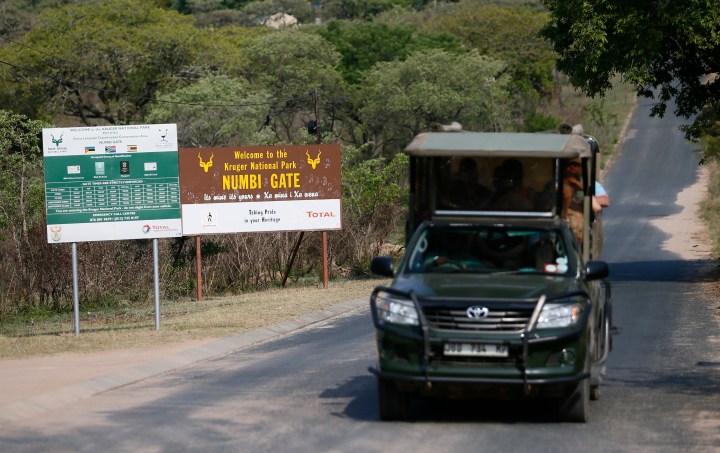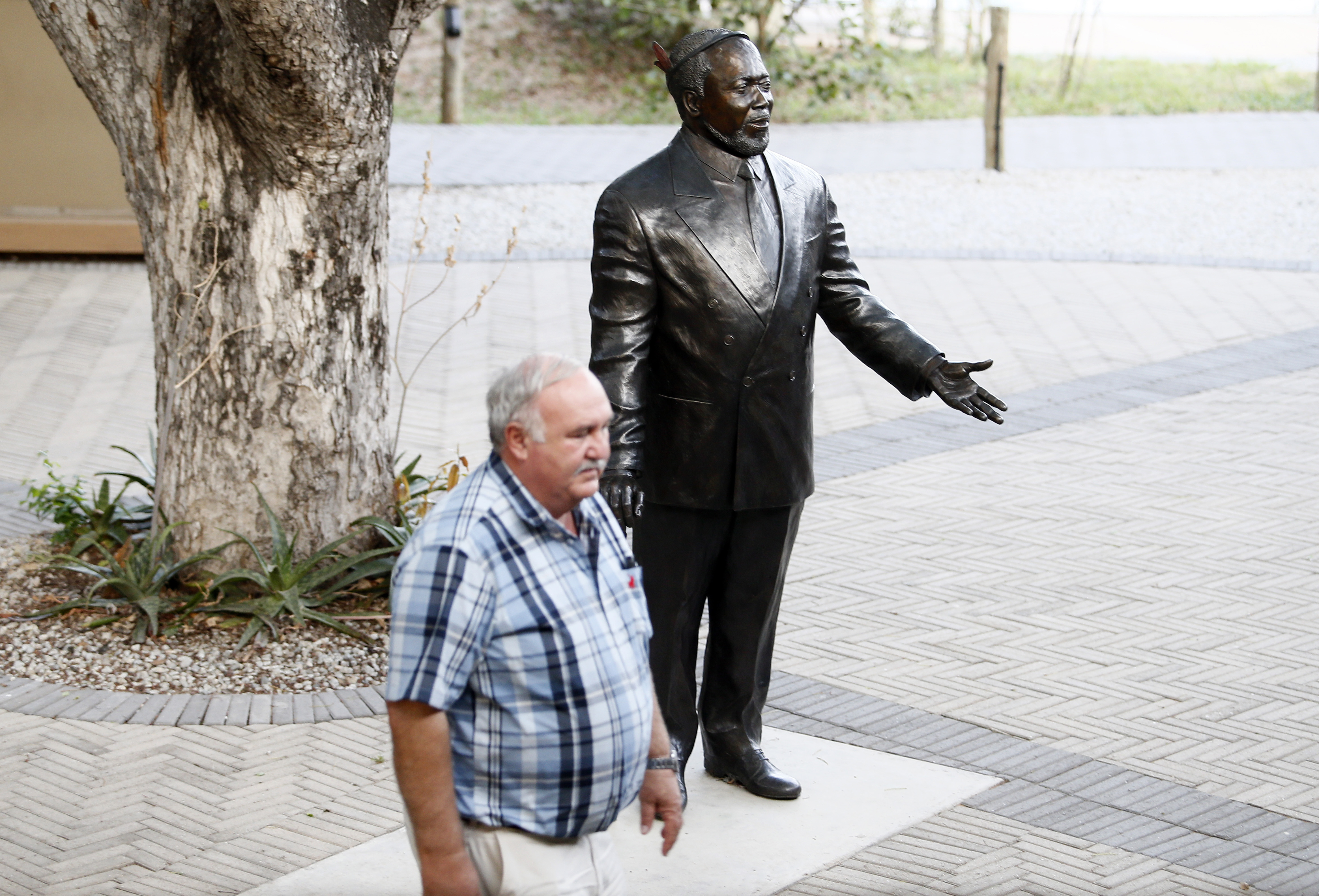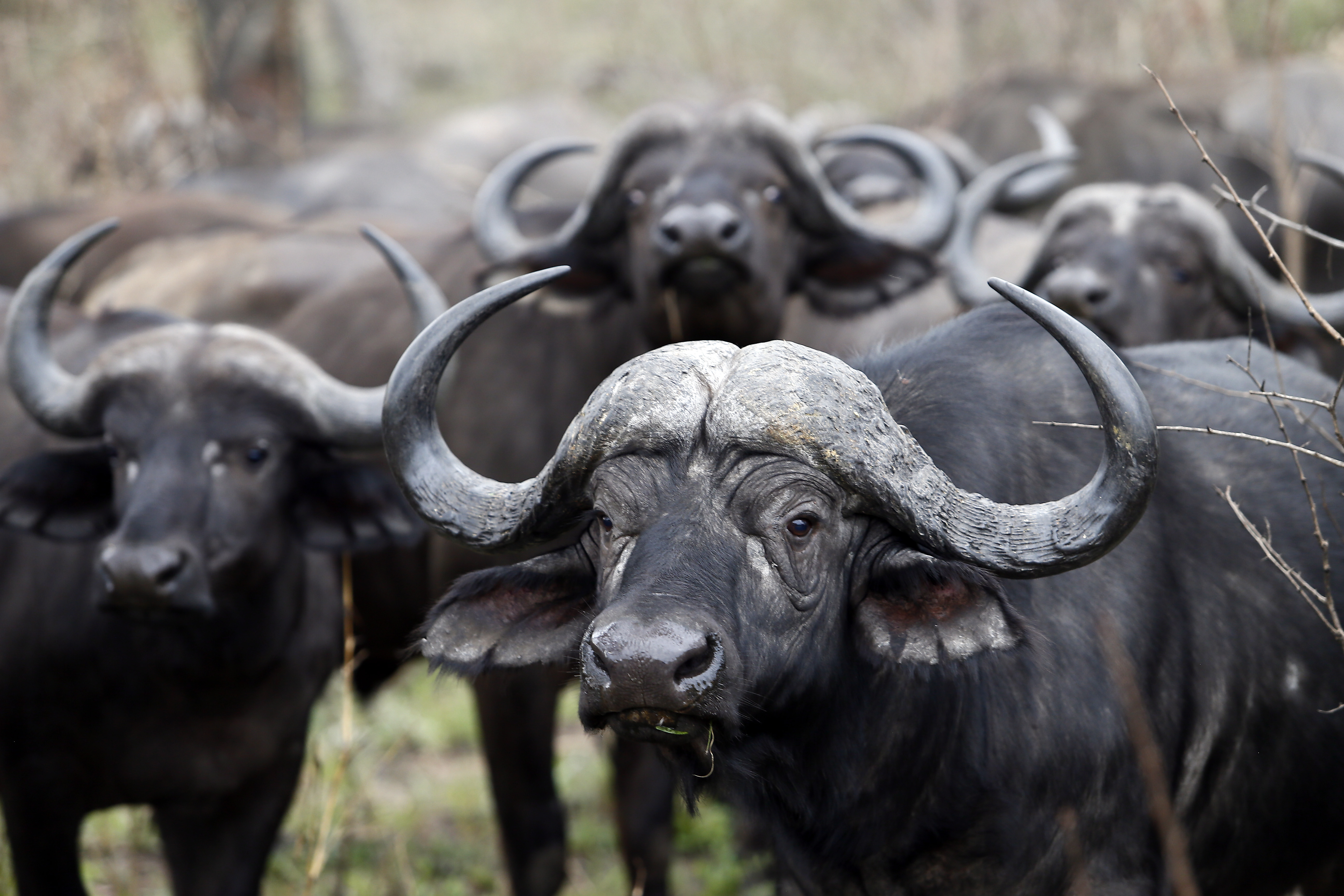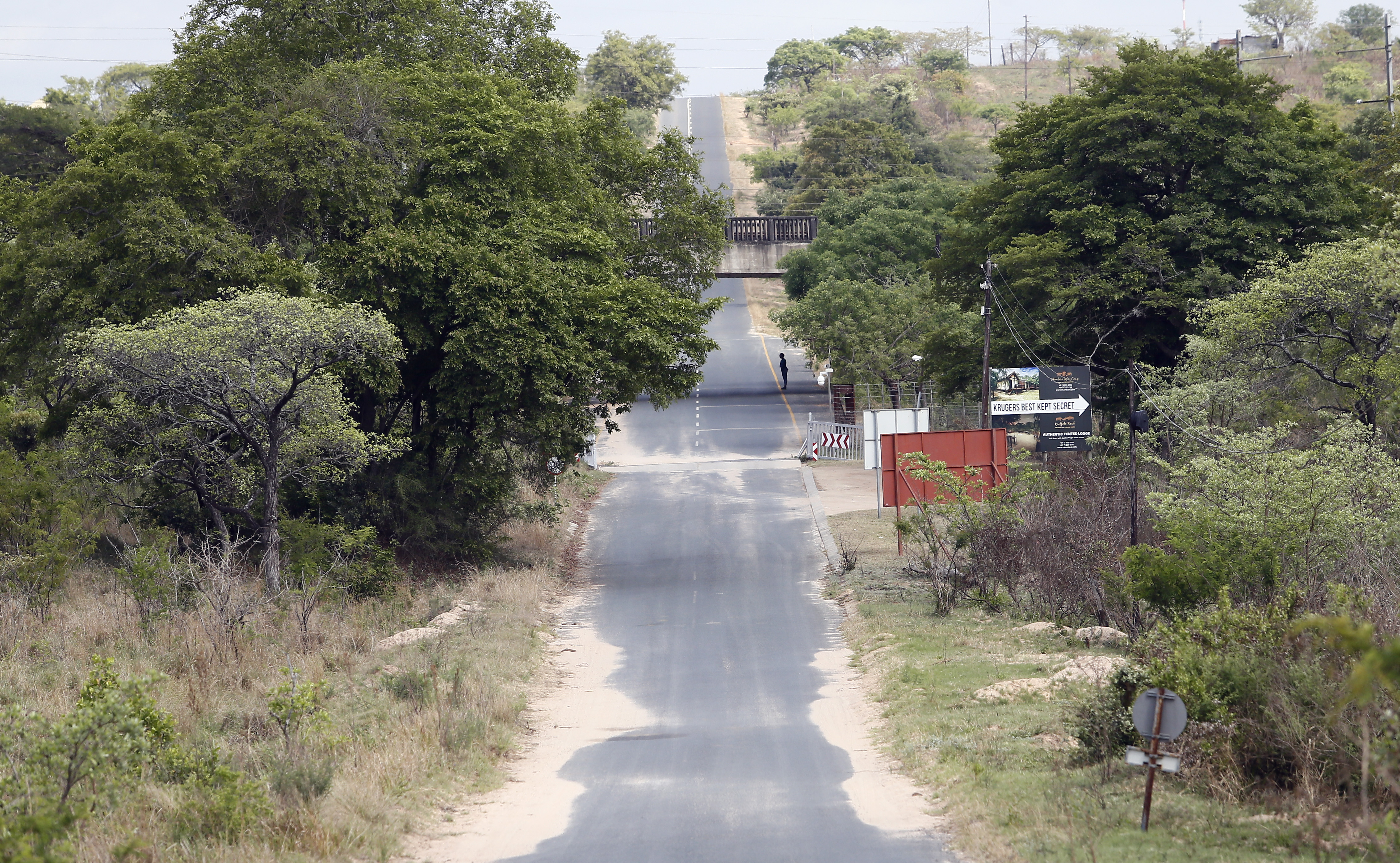KRUGER PARK CRISIS
Poverty and unemployment lurk in the shadow of the murder of a German tourist at Numbi Gate

A land-claim community lodge is one of many businesses having to pay from their own coffers to keep foreign tourists safe in the dangerous neighbourhood of the Kruger National Park – as poor people struggle in areas surrounding the reserve.
Mdluli Lodge opened in January 2020, bringing hope to a community that had reclaimed its land on the edge of the Kruger National Park and wanted to translate that veld into jobs and capital.
Covid crashed that party in March 2020, but business has been on the rebound this year, with overseas and domestic tourists returning.
Perched alongside a mostly dry riverbed and surrounded by lush green bush, the lodge’s location near Kruger’s Numbi Gate seemed ideal – until a 67-year-old German tourist was shot dead near the gate in a botched hijacking on 3 October.
Survivors of the attack spent two subsequent nights at Mdluli Lodge, thrusting management and staff into the unenviable role of trauma counsellors.
Chris Schalkwyk, Mdluli Lodge’s executive manager, told Daily Maverick the lodge’s occupancy rate in August was 62%, 65% in September and 71% in October. But he was worried about November, with advance bookings so far at only 44%.
“There is clearly a slowdown in pick-up in terms of forward bookings that could be attributed to the impact of the unfortunate incident,” he said. The lodge has 100 beds in luxury tents, with plans for 100 more.
The US embassy this month warned its citizens to avoid Numbi Gate “due to an increase in crime” while Tourism Minister Lindiwe Sisulu said closing the gate was a possible option.
Such a drastic course of action would lead to consequences that threaten the viability of a community project rooted in a land claim that employs 70 people, with plans for growth in a region with a youth unemployment rate of around 80%.
“We’ve got a bad record now,” said 33-year-old Vusi Mgwambe outside a bottle store in the village of Makoko, where most of the staff at Mdluli are drawn from. Mgwambe said he was unemployed but he finds occasional construction work. One of his recent jobs was at the lodge during its initial building phase.

A herd of elephants at the Numbi Gate of the Kruger National Park on 18 October 2022. (Photo: Felix Dlangamandla)
Desperate for jobs
When the first 60 positions at the lodge were advertised, Schalkwyk said he received 2,850 applications. Wandile Mdluli, the 30-year-old son of the inkosi who is senior administrator for the traditional council, told Daily Maverick that about 1,000 people pitched up on 18 October in Makoko to apply for 10 jobs linked to a water project.
The village lies several kilometres down a mostly gravel road and it is a drab affair, with little sign of economic activity beyond tuck shops and bottle stores.
“If that gate gets shut down, it will be worse than it is now,” Mdluli said in his soft-spoken manner. A Range Rover drove past at one point, and Mdluli pointedly said, “That’s not from here. No one here drives a car like that.” Mdluli himself drives a modest Polo Vivo.
“The problems are not just at Numbi Gate and, if it is closed, other gates will just get targeted,” said Schalkwyk. A reported armed robbery at Kruger’s Malelane Gate on 16 October underlines that point.
In a trend seen in the platinum mining industry to the west in Mpumalanga and Limpopo, private sector tourism operators have been footing the bill for extra security and are even doing detective work.
“The police don’t have the resources for crime prevention,” Linda Grimbeek, COO of the Kruger Lowveld Chamber of Business and Tourism (KLCBT), told Daily Maverick at her offices in Mbombela mall.
She said KLCBT and the Tourism Business Council of South Africa (TBCSA) had spent R3-million to provide security on the 8.5km stretch of road from Mahushu village to Numbi Gate. This includes a camera and patrol bakkies operated by Hi-Tech Security, a local security company. When DM168 visited Mdluli Lodge, one of the vehicles provided us with an escort to the gate.
Police were conspicuous by their absence, despite the furore after the murder. Over the course of two days, DM168 reporters once saw a pair of police bakkies driving past the gate. That was it. An extra 22 cops are supposed to be in the area as a temporary measure.
Grimbeek said KLCBT had completed a proposal to spend another R2.7-million on security for the road to the gate to cover it with cameras. She hopes to start rolling that out in the next couple of weeks.
“We want a lot more cameras in order to have the entire road under surveillance,” she said. “It’s the tourism operators who are paying for security on a provincial road.”
The industry has also done its own sleuthing. One tour operator, who asked not to be named, said it was tourist businesses – not police – who established in 2019 that many of the armed robbery incidents were being carried out by criminals using rental cars. Grimbeek confirmed this and said that car rental companies had worked with the tourism sector and police to largely eliminate the problem.
There is also a Tourism Victim Support Programme – another private sector initiative – with 52 volunteers on call in the Lowveld. They assist tourists who fall victim to crime or who run into other distressing situations. The fact that a tourism body sees the need for a programme to support victims speaks volumes about the levels of crime and insecurity.

Chris Schalkwyk, Mdluli Lodge’s executive manager, walks near the statue of King Mdluli at the Mdluli Safari Lodge at the Numbi Gate of the Kruger National Park on 18 October 2022. (Photo: Felix Dlangamandla)

David Zabel, investment banker from Berlin, visits the Numbi Gate of the Kruger National Park on 18 October 2022. (Photo: Felix Dlangamandla)
And then there are the protests
Poverty, sky-high unemployment and disputes over land have triggered periodic outbursts of social unrest and protest around the Kruger.
The US embassy, in its recent warning to its nationals, also cautioned them to be “mindful that protests and road closures are frequent in the area”.
Again, this is a reflection of the turbulence around the platinum belt to the west, with a playbook to match: protesters close an access road, be it to a mine or a park, to draw attention to their grievance.
SANParks had not yet sent its response to Daily Maverick queries on the issue before we went to press. Grimbeek said protests occurred, on average, a few days each month, at times stranding tourists in the park while preventing others from gaining access.
“We’ve recorded 25 major protests within the Bushbuckridge area since 2011. This in itself is significant and shows a municipality which has experienced significant and regular protests,” Kevin Allan of consultancy Municipal IQ, which monitors service delivery protests, told Daily Maverick.
This area is a little to the north of the communities near Numbi Gate but Allan noted it was a “pretty good proxy for unhappiness around the Paul Kruger Gate as well as surrounding communities”.
He went on to say, “Six of these protests occurred this year. So there’s been a surge in protest activity and unhappiness in communities. We also recorded two major protests near the Paul Kruger Gate in September this year.”
This underscores the point that it is not just Numbi Gate and communities nearby which are being rocked by unrest.
“Key reasons we recorded for protests are road management and improved access to water,” Allan said. “There have also been protests around perceived nepotism in project selection, staffing [employment opportunities], and management.”
The Kruger Park is an island of wildlife habitat encircled by a sea of swelling human poverty and discontent. About two million people live in communities around the south and southwest of the park.
And to the east, in Mozambique, the levels of food insecurity are either “stressed” or in “crisis”, according to Famine Early Warning Systems Network.
There is a reason why thousands of rhinos have been poached for their horns in Kruger over the past decade-and-a-half, decimating the population. If big animals can be slain with such abandon inside the park, it is small wonder tourists are seen as easy prey on its outskirts.

A giraffe at the Numbi Gate of the Kruger National Park on 18 October 2022. (Photo: Felix Dlangamandla)

A group of buffalo at the Numbi Gate of the Kruger National Park on 18 October 2022. (Photo: Felix Dlangamandla)

An elephant skull at the Numbi Gate of the Kruger National Park on 18 October 2022. (Photo: Felix Dlangamandla)
Failure to get land reform right
This state of affairs raises a point many conservationists find uncomfortable: ecotourism is not an economic panacea. Still, it is the main game in the region, and the capital it attracts, the jobs it creates and the spin-offs it gives rise to are a lifeline for many.
Mdluli Lodge is a case in point. It is a community project that has grown out of a land claim, one that seems to hold promise against the backdrop of South Africa’s wider failure to get land reform right.
The Mdluli community was forcibly removed from their lands inside the Kruger in the 1960s and managed, through the land claims process, to gain freehold title to 850 hectares in 1998. The land is registered under the Mdluli Community Trust.
The lodge is the product of a section 12J investment, through which investors can finance small and medium-sized enterprises and get a tax reduction on 100% of their capital outlay. A private equity fund is the main vehicle for the capital and the community is a 50% shareholder. The community gets 50% of all profits and a bed levy of R44 for every guest that spends a night in the luxury tented accommodation.
Schalkwyk said R120-million had been spent on the project and there were plans for expansion. The lodge employs 70 staff, and more than 150 local people were employed during its construction.
Contestation and conflict lurk in the background, as is often the case with communal land and traditional authorities.
Some members of the “community” wanted their own investors to develop the lodge and they have stoked protests in the past, but there is a court interdict preventing them from causing more trouble, Schalkwyk and Mdluli said.
Things had been picking up at Mdluli, as they have in the wider tourism sector. According to Statistics SA, total income for tourist accommodation surged 191.6% in July 2022 compared to July last year.
Then a foreign tourist was murdered and the government started talking about closing a gate.
This may all blow over soon. There were several German tourists at the lodge when Daily Maverick was there and David Zabel, a 27-year-old investment banker from Berlin, said he had been to South Africa several times in the past and always felt safe.
“In fact, I feel safer this time because there has been so much attention from this incident,” he added.
But mounting social and economic challenges in the region are not going away. DM
This story first appeared in our weekly Daily Maverick 168 newspaper, which is available countrywide for R25.























 Become an Insider
Become an Insider
Trustworthy and visible policing is at crisis levels in SA and security will always cost business. It costs me about the same as electricity. This is the SA of the ANC’s making. The costs of doing business in SA are epic.
Why is Government intent on punishing the common people instead of the perpetrators? Oh of course! Guess who the lead official/ minister is?
I’m not sure that there is any solution to this problem. The measures that are being put in place are just sticking plasters over the main problem- the ever-growing population along the boundary of the KNP. A couple of years ago, one of the KNP senior management estimated that there are 3.5 Mill people living along the western boundary of the park. The majority live in poverty and there are no economic opportunities for a poorly educated, unskilled workforce. Until the population growth is reduced the problem will only get worse but unfortunately no one is prepared to even talk about it due to cultural and race sensitivities.
I am prepared to talk about it and am convinced that if we do nothing to curb population growth we will end up sometime in the not too distant future with a massive problem – when our population growth is out of control. This will cause all our resorces to disappear and SA will become an unpleasant place to live. We must do something now – introduce a penalty tax on too many children – I’ve discussed ths before. One merely has to look at the growth of informal settlements to see the problem developing…
There’s poverty and inequality in every corner of the world, but for South Africans the solution seems to be crime, sabotage, violence aimed at other citizens. Why can we not take aim at the originators of the situation – the ANC government – and punish them at the ballot? Why is that so hard to do??
A good summary of the issues.
Improved security will only go so far. Until more people from neighbouring communities have a stake in the continued well-being of Kruger (and other parks) these parks will remain vulnerable – to crime, protest action, poaching syndicates etc.
This means creating a much more inclusive wildlife-tourism economy in which local people and businesses historically excluded from economic opportunities linked to the park are systematically included – as food growers, suppliers, building and maintenance contractors, tour guides, operators etc.
Great chunks of the supply chain into Kruger are low-skilled and labour-intensive. One can readily incentivise a wide range of commercial partnerships across the supply chain, involving the park, lodges, existing operators and suppliers etc. to create and expand business and employment opportunities for local people.
This requires coordination, a little bit of well targeted money and a move away from the facile corporate social investment ‘projects’ beloved of many of the lodges.
To get the interests of neighbouring communities aligned with the goals of conservation, more of the value generated by our parks needs to be shared locally. And this means developing real business linkages across the wildlife economy which are sustained not by grants and welfare projects but by commercial incentives that work for all the parties involved.
This is yet another argument in favour of a basic income support grant, so that people may have something to stand between them and starvation, and even give them something which may enable them to start up an income-generating initiative. It would benefit not only the poor and unemployed, but also the comfort, safety and security of the entire locality, (and the consciences of those who have the means and ability to develop and enjoy it). Why can’t we see that such social justice and protection would benefit the whole of South Africa?
I agree 100%. But unfortunately we have an inept and corrupt government with cadres and officials who first drain the coffers so that a basic income grant just can’t happen. So, unless the poor see that the ANC is a has-been, the EFF is just a one-man show, then they’ll get what they vote for. Empty vessels and empty promises.
Totally agree 100% that’s a permanent solution.
The tourism industry is faced with many challenges and the murder of the German tourist certainly did not help not only the industry but the communities that benefit from it. There is no excuse for any hideous crime as unemployment and poverty is everywhere and we must be very careful never to justify crime and criminality. The industry has had horrible Ministers who ought to have never been given the portfolio. First it was Kubayi who brought issues that had nothing to do with Covid on Covid relief funds for the industry and received a promotion.
The next was Minister Susulu with very insensitive comment after the murder of the German tourist. The President of the country seems not to grasp the importance of tourism to the economy of the country and its role in promoting the image of the country. Hence the appointment of horrible Ministers to lead such a strategic portfolio that has an interface with many areas of government work. The article captures one of the issues around land claims and reforms in one of the premier tourist destinations of the country. The others range from sports and culture to environment and conservation. This means that once you bring clowns to the department, they will turn it into a circus. It must relate with those who are responsible with safety and security to ensure that tourists to our country do not leave in body bags. More importantly, we need a President who cracks the whip when a Minister has a lavatory mouth.
With due respect to you read a book SPIRIT LEVEL WHY EQUALITY IS GOOD FOR EVERYONE.
These are merely symptoms of a badly managed economy. For nearly 30 years the government has pushed the socialist agenda resulting in deindustrialisation resultant massive unemployment and poverty. Only when the government makes South Africa attractive to wealthy investors will unemployment and poverty fall. When the economy starts working and people are receive better education they have fewer children, and are able to support them. There is significant research showing this correlation. What unemployment rate will make the ANC realise their alliance policies are failing? 50%? .. 60%? The entire state fails long before then as all real wealth and taxpayers will be residing in other lands.
Policing and security are not solutions. You have to fix the cause.